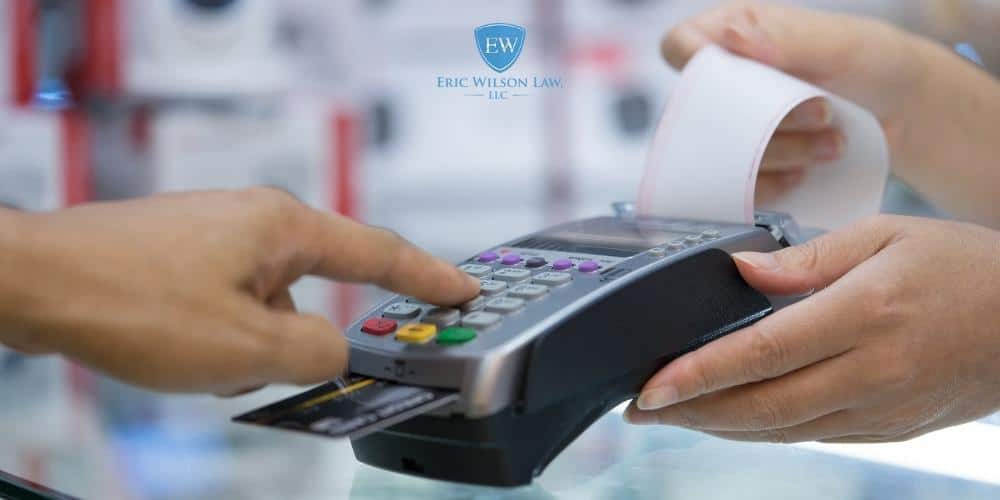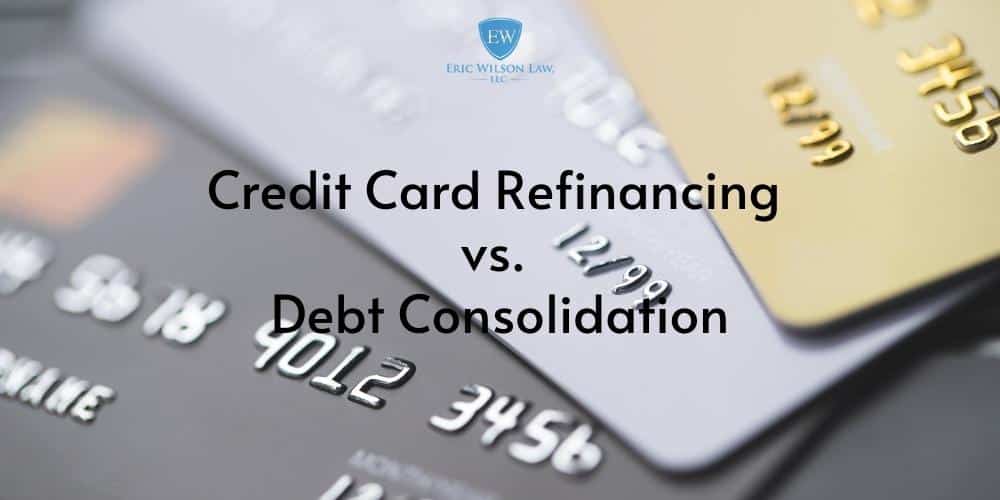If you feel like you’re drowning in credit card debt, you’re certainly not alone. In the last quarter of 2020, Americans shared a grand total of $820 billion in credit card debt. Additionally, the average American has at least $5,000 in credit card debt. These are huge, scary numbers. The good news is that there are plenty of debt relief options out there: credit card refinancing vs. debt consolidation. Refinancing credit card debt involves moving all your debt from one card to a 0% interest rate balance transfer card. Meanwhile, debt consolidation involves taking out a personal loan in order to pay off debt.
Below, the legal team at Eric Wilson Law LLC explains the difference between credit card refinancing and debt consolidation and which option is best for you. If you still need financial guidance, call 205-349-1280 to schedule a free consultation with Eric Wilson.
What is Credit Card Refinancing?
As the name suggests, this is one of many ways to refinance credit card debt. Refinancing credit cards means that you apply for a credit card with a 0% interest balance transfer fee that also has a large credit limit. This allows people to transfer a large amount of existing credit card debt to a credit card with a lower interest rate. That way, they can hopefully pay off their debt within 12 to 18 months, which is how long the 0% interest promotional period generally lasts.
If debtors fail to pay off their credit card debt within this window, then the credit card interest rates will jump back up to the usual 16% to 20%.
What is Debt Consolidation?
Debt consolidation is another common way to pay off existing debt. With this method, debtors will take out a secured personal loan with a low interest rate, often called a debt consolidation loan, in order to pay off one or multiple credit cards. Interest rates for debt consolidation loans can vary between 4% and 36%. The interest rate you can get will heavily depend on how much collateral you can offer and how high your credit score is.
In order to do credit card debt consolidation, you must first obtain personal loan approval. This means you need to have a good job, a good credit score, and good home equity.
Taking out a personal loan in order to consolidate debt sounds like a quick and easy way to wipe out your credit card debt, but you have to remember that you eventually have to pay off the loan too. Generally, this entails making monthly payments until the loan amount is paid off.
You can either take out debt consolidation loans or unsecured personal loans in order to pay off your credit card bills. The main difference between the two is that you don’t have to offer collateral – AKA something in return – in order to obtain the unsecured personal loan. This means you may have a much higher interest rate compared to a secured loan, which could make it more difficult to pay off over time. But having a personal loan with a higher interest rate still may be a more affordable debt relief option than having credit card debts with high interest rates.
Credit Card Refinancing vs. Debt Consolidation
If you’re struggling every single month to pay down your credit card balances, you may find yourself deciding between credit card refinancing and debt consolidation for debt relief. What is the difference between the two? And how do I choose which option is best for me?
Credit card refinancing is basically just moving all your credit card debt to 0% balance transfer credit cards in order to pay off the debt within that short promotional period. If you have too much debt and you can’t pay it off within 12 to 18 months, you’ll basically be back to where you started – with a credit card interest rate between 16% to 20%.
Another option to potentially achieve debt relief is to consolidate credit card debt by taking out a secured or unsecured loan. If you’re able to qualify for a personal loan, your credit card debt will be wiped out pretty quickly. But that just means you’ll have to spend months or even years paying off the personal loan, which may have a pretty high interest rate depending on your credit score and the amount of collateral offered.
Pros and Cons of Credit Card Refinancing
If you still can’t decide which debt relief option is right for you – credit card refinancing vs. debt consolidation – no need to fear. The legal team at Eric Wilson Law will break down the pros and cons of each option for you.
Pros of Credit Card Refinancing
If you want to refinance credit card debt, these are the pros to keep in mind:
- It’s easy for most people to apply for credit card refinancing.
- You won’t have to pay interest on your credit card debt during the 12 to 18 month promotional period.
- If you choose a 0% credit card with a large credit limit, you could move all of your debt onto one card and save money in the long run.
- If you can pay off your credit card balances within 12-18 months while also using your credit cards less in general, you’ll essentially have a clean financial slate moving forward.
- Refinancing credit card debt allows you to pay off debt faster, especially if you already have good or excellent credit.
Cons of Credit Card Refinancing
Listed below are the cons for credit card refinancing:
- Credit score requirements may make or break this option for you. You may not qualify for a 0% interest rate balance transfer credit card if your credit score is below 670. And if your credit score is below 700, you may not be able to get an introductory period on a 0% interest balance transfer credit card that lasts longer than 6 months.
- If you don’t pay off debt on 0% interest balance transfer cards within 12 to 18 months, you will be charged interest again. Basically, you’ll be back where you started with an interest rate between 16% to 18%.
- In order for credit card refinancing to work in your favor, you must find a credit card that has a large enough limit to take on all or the majority of your credit card debt.
- You will have a 3% to 5% balance transfer which will be added to your total credit card debt.
- You could be penalized by losing the 0% interest rate if you make mistakes like forgetting to make a timely payment or exceeding the credit limit.
- If you try to transfer debt from one card to another that are both issued by the same credit card companies, you may be rejected.
Pros and Cons of Debt Consolidation
If you want to choose debt consolidation as your debt relief method, you can expect to make fixed monthly payments for several months or years until your debt is paid off. This is certainly a slower debt relief method than credit card refinancing, but still, it may be the best option for you especially if you’re prioritizing lower interest rates. Listed below are the pros and cons of credit card debt consolidation.
Pros of Debt Consolidation
- Generally, people can get way lower interest rates on a debt consolidation loan compared to credit card refinancing.
- You will have a fixed monthly payment for 3 to 5 years.
- If you are able to qualify for an unsecured personal loan, you won’t have to offer collateral in return.
- If you can obtain a personal loan from a close friend or family member instead of online lenders, you could have little to no interest. Additionally, receiving a loan from someone you trust could be much easier, and much less stressful, to pay back. Basically, getting help from family and friends can create the world’s best personal loan.
- You will only have one monthly payment to worry about instead of multiple monthly payments for multiple debts.
Cons Debt Consolidation
- If you get a secured personal loan and you offer collateral in return, you could potentially lose that collateral if you miss a payment or can’t afford your payments. For example, if you get a home equity loan in order to consolidate credit card debt, you could end up losing your home if you can’t keep up with the loan payments.
- Sometimes, getting personal loans doesn’t happen overnight due to the approval process. So you could end up racking up more debt while waiting for the loan to come in.
- If your credit score isn’t high enough, you may not qualify for good interest rates or you may not qualify for a personal loan at all.
- Debt consolidation may not benefit you at all if you can’t slow down on your spending in the 3 to 5 years it takes to pay off your loan.

Call a Tuscaloosa Bankruptcy Lawyer at Eric Wilson Law Today
Eric Wilson Law LLC in Tuscaloosa, AL is a debt relief agency. That means we are here to help you save money and improve your financial situation through any means possible: bankruptcy, credit card refinancing, debt consolidation, a debt management plan, you name it.
If you’re still confused about which debt relief option to choose – credit card refinancing vs. debt consolidation – call Eric Wilson today. He can carefully analyze your financial situation and help you determine the best way to pay off your credit card debt. Call our law office today at 205-349-1280 to schedule a free consultation.



